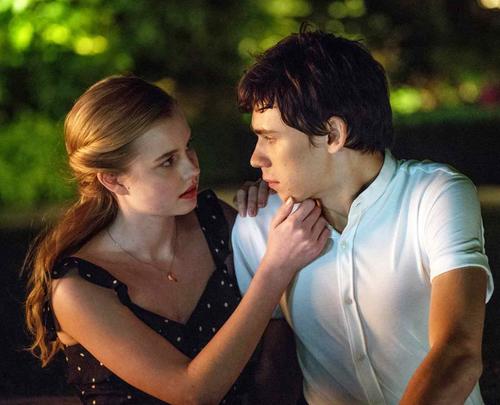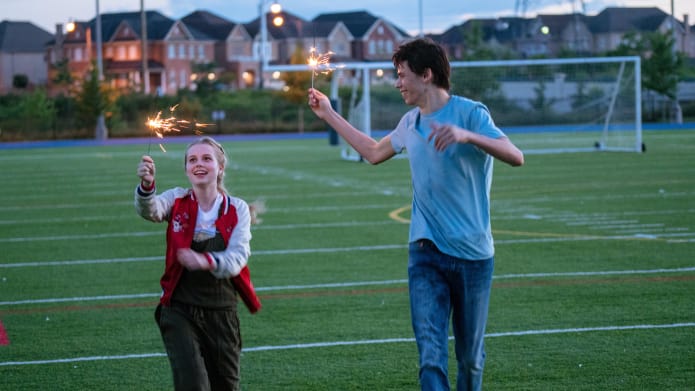Based on the wildly successful 2012 novel about a disembodied soul that inhabits a new host each day only to fall in love—and want to settle down—with a smart, lonely high school girl, Every Day is, for a movie about teenagers, as ambitiously conceived as it is emotionally generous. Employing a “YA” (read: Young Adult) context to examine themes of love, soul connections and the capacity to navigate major relationship changes, the picture is surprisingly thoughtful and exceedingly well-acted by delicate Australian star Angourie Rice (The Beguiled).
In telling the story of 16-year-old Rihannon (Rice), who finds herself in a complex relationship with A, a traveling soul spending just 24 hours inside each person it inhabits, Every Day stretches beyond familiar teen tropes and asks us to look, sometimes seriously, at the nature of a love that transcends race, sexuality and gender. And that is kind of a big deal for a movie about teens today.
I recently caught up with Every Day novelist David Levithan, author of a most popular collection of books about young people (including Nick & Norah’s Infinite Playlist, which itself was a delightful 2008 movie romp) for a chat about the movie Every Day, his thoughts on its themes, generational mores and attitudes today and his enthusiasm (and my own) for this sweet new movie adaptation.
I was struck by the conceptual sophistication of the story in a teen context. I liked that it took its themes seriously and you come to care about its characters.
David Levithan: I’m so impressed by the filmmaking and as you said, how it takes the subject matter so seriously. I think we think of teen movies as loud, romantic screwball comedies and larger than life. What I love about this one is that it is not a quiet movie, but it takes its own time and gives the viewer a lot of credit to keep things together rather than saying things outright. It respects what adolescence is about in a way that Lady Bird does also.
Interesting you mention Lady Bird, which also takes the thoughts, feelings and world view of a teenager quite seriously. Let’s talk about your character here, Rihannon. She is quite progressive in her ability to comprehend something that we might thing could be a challenge.
DL: Yes. In writing the novel there were two central questions. From A’s point of view, it would be the question of who you would be if you weren’t assigned (to a different) body. And from Rihannon’s point of view the question is whether you can love somebody who does actually change every day. We always say, ‘I love you for who you are.’ But do people really have the strength to do that when they are challenged? So, I do think she is obviously confused, but once she understands that she is in love with the person inside she must be strong to follow through on that, and that is really where the central tension comes from—there are obstacles in the way of that.
It made me think about how in a traditional love story we are hung up on the casting of actors who have physical chemistry. And in this one, Angourie has it with ten different actors of different genders and it really is because the emotional part of it works so well. It has nothing to do with how they look together onscreen.
DL: Yes, and Angourie did such an amazing job with it. She is so believable in the role. We can’t underestimate the power of having a 16-year-old play one, and her age informs that, and her reactions are amazing. She walks that fine line and does not react to every single person the same way even though they are A. She reacts differently but conveys the underlying love for all of them. She went there in such a profound way. Everyone that I have talked to who has seen this has been with her all the way.
As the author of the book, can you look at the movie on its own terms or do you always look back and think about how you wrote the piece? It must have been the same for Nick & Norah’s Infinite Playlist.
DL: The first time is always weird! I generally do not read the script or revisions, so I experience it for the first time when it is an actual movie. So, the first time I see it there’s a lot of processing going on, like ‘That’s an interesting choice!’ With this movie I really grew to understand and love a lot of the choices they made. Some places quite frankly I felt like if I could rewrite the book over again I would incorporate the changes!
I know you spent some time on the shoot. What happens when writer comes to the set? How does everyone react?
DL: I think everybody is amused and respectful at the same time. It’s that strange experience of looking around and saying, ‘Wow, this was all in my head and now it’s reality and hundreds of people are working on it!’ Everyone was so lovely about it. As a teenager, Angourie had read the book two years before she got the script, and that was cool that she had experienced it as a reader. Only later did she become the embodiment of one of the characters.
There’s a lovely line in the movie about how sometimes the mind and the body do not match. It really gave me pause to think about how this younger generation processes the issue of gender. It’s so much different than you and I perhaps might as Gen X. Some scenes in the film felt so provocative to me, like the locker room kiss. But it may not feel radical at all to them because they have evolved on this.
DL: I think a lot of them have. And I think honestly in the five or six years since the book came out I have seen it happen in school visits and other talks I have done. At first, some people understood concepts of gender fluidity or being transgender—some people did—but now as the years have gone by, I honestly think partially because of internet-related ways that kids learn the definitions of these things, teenagers are much savvier conceptually about things, like the idea that you don’t have a set gender and you get to decide what that is no matter your body. And as you said, for our generation that is a deeply radical notion, but I think for a younger generation it can depend where they are growing up and which adults are in their lives. But I think at this point for a lot of kids it seems like a self-evident fact while for their teachers or parents it might not be.
I heard the term ‘openly gay’ the other day with respect to Olympic skier Gus Kenworthy, and it really struck me funny as in 2018 it seems positively archaic. Through the lens of characters being open about such things in your work, you certainly have dealt with positive depictions of love, identity and life as it relates to gay teens in, for example, Boy Meets Boy.
DL: Right. I think sports is one of the last bastions where openly gay contextually might make some semblance of sense, and I don’t want to defend it because I agree with you and it feels archaic. But I think there has been so much of a shift in our culture that things that were once shocking are no more. If you look at the trailer for Every Day there is a girl kiss, a boy kiss, all sorts of races and sexualities and identities represented, and I have not seen any pushback whatsoever. Twenty years ago, if we’d had a movie with that trailer there would have been picketing at the theaters. So I have to believe there is an evolution at work and obviously there is a push back that goes along with every evolution. But again I think time and again in my experiences as writer, following these books into the world, I have found that if there is a divide it is such a generational divide. The younger generation views all of this controversy as archaic. They are not shocked or bothered and they find it silly.
Speaking of things that resonate with readers, this particular book spent a long time on the New York Times bestseller list and there were lots of things with which people connected. To what do you attribute this?
DL: Well I think it was the themes that people wanted to talk about—identity, gender and race—married to a simple paranormal concept of waking up every day in a different body. Somehow if I had written a realistic novel about an identity crisis or search I don’t think it would have been as readily accessible as one that was hung on this paranormal conceit. So I love that.
I was taken with a sequence late in the film that imagines what a potential future might look like should the central relationship continue. The extrapolation in terms of what could happen and how difficult things might be seemed, for a fantastical concept, quite grounded and realistic.
DL: Yes, they really brought it home. And again, Angourie is wonderful but Owen (Teague) is just as good. You really believe what he is saying. And again, as the author, the sequel to Every Day, novel wise, is coming out in October. And I deliberately finished it before I saw the movie and I was very nervous about the ending of the movie and if it would fit with what I had just spent two years writing. And it is kind of amazing that it does fit beautifully into that and I think the dilemma they face does not go away at all and is very well articulated by the film.
If you were to jump into someone’s body right now for 24 hours and intervene in a life, who would it be?
DL: I would not want to do it! I would not want to take responsibility for anybody else’s life. I think it’s enough to take responsibility for my own!
What is the best part about your job?
DL: As an author it is seeing the effect that books have on readers. My day job in publishing would be the same answer. In a world where teenagers are being encouraged to forge their own identities but also where a lot of the information out there that influences them forging their identities can easily be taken out of context, as a novelist you can present such in context. A lot of times you hear from readers that it is exactly what they needed.





